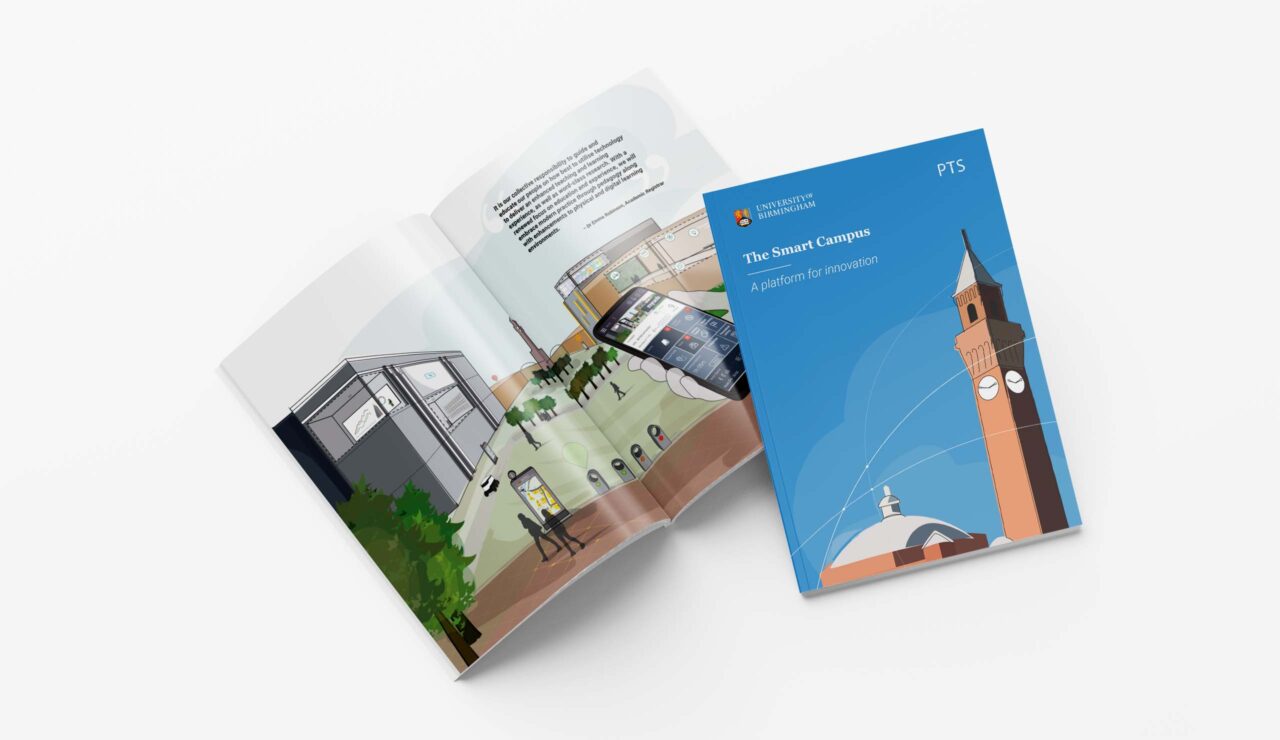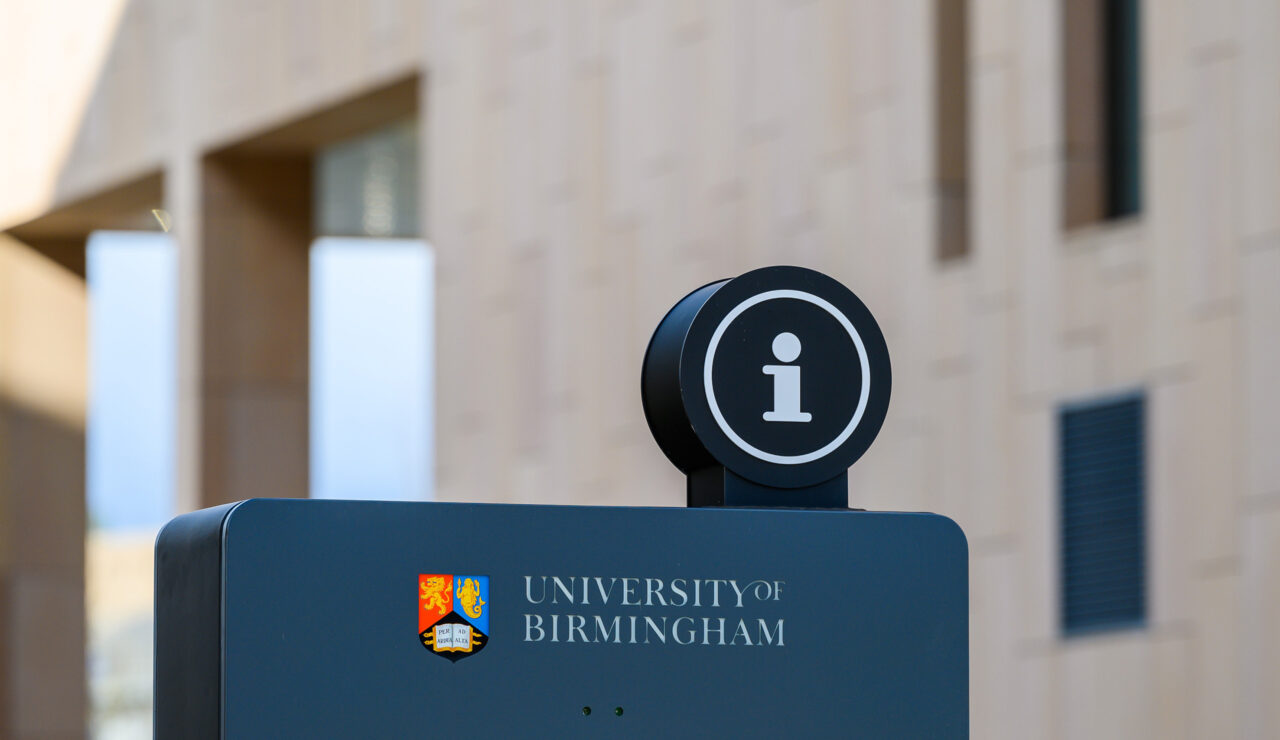The University of Birmingham
Smart Campus Strategy
PTS worked with the University to create their Smart Campus strategy, capturing how a Smart Campus could deliver tangible benefits to the University’s users in terms of Experience, Efficiency and Environmental Sustainability.

Location
UK, Birmingham
Completion Date
2022
Introduction
The University of Birmingham came to PTS with a mission to create their Smart Campus strategy:
- To deliver an enriched, personalised experience for students, staff, academics and visitors.
- To bring together its people, processes and services to become a fully connected, global campus.
A cornerstone of delivering this mission was to develop the world’s smartest campus, which would enhance the physical and digital foundations of the University, whilst protecting its cultural and physical heritage, and realising cost savings. By embedding emerging technologies across its physical estate, it would create a campus capable of adapting to advances in technology together with the changing needs of its people. The use of such technologies would unlock data and information that could be harnessed for valuable insight, facilitating living lab opportunities to enable world-leading research, teaching and learning.
The University developed the following smart campus objectives:
- Efficiency: Delivering efficiency and enhanced collaboration through agile workplace optimisation and utilisation
- Experience: Creating extraordinary physical and digital experiences for students, staff, academics and visitors
- Environmental sustainability: Embracing sustainable practices to ensure delivery of a modern campus that will adapt to changes in technology, learning and climate whilst also protecting both cultural and physical heritage, and realising cost savings.
The University appointed PTS to help turn this vision and objectives into a coherent, ambitious and implementable strategy.
“The University engaged PTS to support the development of our smart campus vision, mission and foundational strategy as we saw the value of having an external, independent view on the approach we were taking. We also felt that their experience in the Higher Education sector, combined with their understanding of both the physical estate and the digital world, would bring a useful perspective.”
Matt Beveridge – Innovation Manager, University of Birmingham
Solutions
Vision Brochure
PTS worked with the University to better understand its aspirations, turning this into a Smart Campus vision brochure encapsulating its mission, vision, objectives, and a visual walkthrough of the benefits to people on campus.

Current State Assessment
We then engaged with the wider University to understand the University’s current state and high-level of smart maturity, this included:
- Enabling elements
- Passive Network
- Active Network
- Middleware & Architecture
- Sensor Network
- Audio Visual/Unified Communications
- Building systems
- BMS
- Lighting Control
- Metering
- Environmental Monitoring
- Security & Safety
- Space Utilisation
- Data Management
- Other areas of innovation
Smart Campus Playbook
Having established the current state, PTS collaborated with the core team to develop a Smart Campus Playbook. One of our core principles around the Smart Campus is that the benefits it brings are far more than the sum of its parts. We believe that the best way to explore these benefits is to start with the user experience; in other words, will it help solve current challenges faced by people across the University, or afford new opportunities previously unavailable?
PTS explored these challenges and opportunities, from the perspectives of the many different University stakeholders, showing how a Smart Campus will look to them so that the benefits become far more apparent.
The playbook included over 100 different user scenarios, from the perspectives of various personas, including students, academics, professional services, researchers and visitors. The use cases included:
- Academic-led sessions (lectures and seminars)
- Access to material and information e.g. Library
- Break from work/study
- Campus navigation
- Cultural collections
- Energy management
- Environmental quality
- Exams
- Graduate intake
- Groupwork and collaboration
- Health and wellbeing
- Maintenance and repairs
- Personal study and revision
- Privacy and data
This exercise allowed all stakeholders, regardless of their technical understanding, to put the benefits of smart into the context of their own roles and responsibilities.

Guiding Principles
Having comprehensively explored the future state, PTS developed guiding principles to underpin the University’s mission and realise the Smart Campus objectives. A guiding principle is a core principle or rule set that the University adopts, which guides decision-making and behaviour in all subsequent programmes, projects, initiatives and Business as Usual (BAU) activities, in order to realise a particular vision.
Drawing upon industry best practice, these principles covered the following areas:
- Purpose
- Public good – must be used to deliver genuine public benefits in perpetuity
- Value creation – must enable value creation and performance improvement
- Insight – must provide determinable insight into the built environment
- Culture & belonging – must foster belonging and promote the University’s culture and ethics
- Trust
- Security – must enable security and be secure itself
- Openness – must be as open as possible
- Quality – must be built on data of an appropriate quality
- Transparency & control – must make data analysis publicly available and give people complete autonomy over its use
- Function
- Federation – must be based on a standard connected environment
- Curation – must have clear ownership, governance and regulation
- Evolution – must be able to adapt as technology and society evolve
- Simplicity – must be kept as simple, consistent and easy to operate as possible
Innovations Assessment
The University’s Smart Campus vision and desired user experiences would be reliant on a complex ecosystem of technologies, infrastructure, systems, processes and applications. PTS evaluated and prioritised the various investments within this potential ecosystem based on the extent to which they delivered the University’s objectives, and the complexity and cost of the investment. These investments were then categorised as follows:
- Enabling Investments – investments that deliver the foundations on which additional functionality and user scenarios can be built
- Bronze-level investments – investments that deliver functionality and user scenarios, and score positively in terms of cost/ease of implementation
- Silver-level investments – investments that offer greater value but may incur greater cost or difficulty in implementation
- Gold-level investments – premium investments that deliver excellent value but also incur more considerable cost or difficulty in implementation
Financial Analysis
Based on industry examples, current campus statistics and our own experience, and in addition to the user-centric benefits explored in the Playbook, the PTS team provided ROI forecasts based on the following categories:
- CapEx optimisation
- OpEx savings
- Revenue
Other non-financial returns included a demonstrable positive impact on student satisfaction and attainment, and a significant contribution to becoming a net zero carbon institution.
PTS also provided a budgeting forecast over a multi-year period, broken down into CapEx and OpEx. This helped the University to make an informed decision on the level on investment required to match its ambition, and the corresponding benefits and return on that investment.
Roadmap for Transformation
PTS completed the deliverable by mapping out the various projects and initiatives to undertaken the prioritised investments into a Smart Campus Transformation Programme.
“It has been great to have an independent critical friend to validate our assumptions and boil down all of our conversations into a really clear vision and foundational strategy. The benefit that PTS has brought is that they’ve actually helped us to get that focus which puts us on the front foot for how we start to deliver some of these initiatives as we move forward.”
Trevor Payne – Director of Estates, University of Birmingham
Benefits
Thanks to its partnership with PTS, the University has derived the following benefits:
- A vision document that provides a high-level view of its smart campus aspirations to be disseminated to all of its stakeholders groups, declaring its statement of intent
- A smart campus playbook rich in colour which demonstrates the benefits of a smart campus in language that all users can understand, and from their perspective.
- A broad assessment of the gap between the current and desired future state, with all investments independently evaluated and prioritised based on the strategic objectives of the University.
- Identified and qualified emerging breakthrough innovation opportunities through horizon-scanning, benchmark analysis and targeted research.
- Worked with a range of different Stakeholders from across both professional services and academia to develop and curate the University’s collective innovation ideas pipeline.
- Developed a compelling story that conveys the University’s innovation aspirations and opportunities relating to the Smart Campus Living Lab (in both Edgbaston and Dubai).
- A clear and evidenced plan of action to realise the benefits
“It was invaluable to have a partner who could help us to take all of our ideas, aspirations and discussions and turn them into a clear set of objectives and a roadmap for change. PTS has been instrumental in providing valuable guidance and support in our Smart Campus efforts. I would recommend PTS to other Higher Education Institutions looking to create an Innovation Strategy that can positively impact their Estates and Facilities Strategy and Operations.”
Matt Beveridge – Innovation Manager, University of Birmingham
